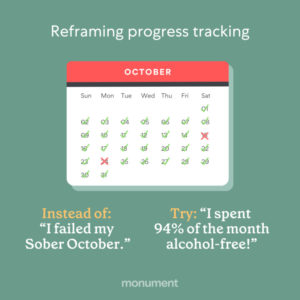What is Sober October?
Sober October is a month-long event that encourages people to abstain from alcohol. The goal is for people to take a step back from drinking in order to improve their overall health and learn more about their relationship with alcohol. In many ways, it’s similar to Sober September and Dry January, the public health campaign that urges people to abstain from alcohol at the start of the new year.
What is the Origin of Sober October?
Sober October was founded in 2014 by the Macmillan Cancer Support group, a charity foundation based in the United Kingdom. While originally founded as a means to raise money and bring greater awareness to those battling cancer, Sober October has since become an even broader movement, with people participating across the globe for a variety of reasons. That said, it’s still a great time to consider giving back, which is often a crucial component of a long-term sobriety journey. With all the money saved by not drinking, folks can donate those funds to help people living with cancer.
How Do I Participate?
Participating in Sober October can look different for everyone. If 31 days sober is your goal, that’s great! If you want to use Sober October to meaningfully cut down on your drinking, that’s great too. That could look like reducing the number of days drinking, or number of drinks consumed when you do drink. (See how to practice more mindful drinking.) Sober October is all about prioritizing yourself over alcohol, and learning about how best to support your health and wellness. However you choose to participate in Sober October, peer support can be incredibly helpful. Whether that’s the global Sober October community, or a friend or family member who wants to join you in the challenge. You can also explore alcohol support groups and treatment options for guidance and encouragement throughout the month.
If you want to take part in the charity aspect of the challenge as well, you can sign up for the Sober October fundraiser on the Macmillan website. You can then ask your friends and family to donate to the cause, and help raise money for people who are battling cancer.

Benefits of a Sober Month
As you might imagine, abstaining from alcohol for a month can have tremendous health benefits. You may experience some discomfort at first as your body recovers from past alcohol use, but with time, many physical, mental, and lifestyle benefits are likely to appear. Let’s discuss what you might look forward to.
Improved Sleep
A common misconception is that drinking alcohol will help you get a good night’s sleep. Many people don’t realize that alcohol disrupts your sleep cycle and will leave you feeling more tired in the long run. Why? First, drinking before bed causes you to get less REM sleep (Rapid Eye Movement sleep), which is crucially important to rejuvenating your body. Secondly, alcohol can cause frequent sleep disruptions, such as needing to get up to urinate.
Without alcohol in your system, you’ll start waking up without hangxiety and with more energy, which can have an amazing ripple effect on your entire life.
Better Mood
Alcohol is a depressant, which means it disrupts the balance of chemical messengers in your brain. This, in turn, affects your feelings, thoughts, and behaviors. While alcohol might initially make a person feel relaxed and less anxious, the effect soon wears off and leads to a chemical imbalance that can cause feelings like anger, anxiety, or depression. In the long term, alcohol use can actually decrease your overall levels of happiness chemicals, like serotonin and dopamine.
When you stop drinking, you can regain your natural balance of ‘happiness chemicals’ and experience more authentic joy. You might also notice that your mood has become more stable and elevated in general.
Improved physical fitness
Alcoholic beverages are extremely high in “empty calories,” or calories that carry no nutritional value. Taking a break from alcohol can help you maintain a more nutritious diet, which can lead to weight loss and improved physical fitness. Plus, with more energy and free time, you’re more likely to engage in exercise and other healthy activities.
Increased hydration
Drinking can dehydrate the entire body. The benefits of cutting out alcohol and being more hydrated include:
- Healthier skin
- Reduced dark circles around the eyes
- Fewer headaches
- Better overall physical health
More Savings
As most everyone knows, alcohol is expensive. This is especially true when you visit bars and restaurants. Plus, alcohol use can lead to other hidden expenses like hangover solutions, unnecessary cab fares, and late-night food or shopping. If you’re looking for another incentive to give up alcohol for a while, try considering the extra money you’ll save.
And these changes are just the beginning, there are many more benefits of sobriety to uncover!

Tips for Sober October
So clearly, Sober October is good for your body, mind, and wallet, but flat-out quitting alcohol isn’t always easy to do. The good news? You’re not alone! Here are some tips to help you prepare for a month without alcohol and ensure you get the support you deserve.
1. Recognize Triggers
Most people have triggers that cause them to turn to alcohol for relief or reward. As you plan to stop drinking in October, it’s important to recognize your unique triggers and create a plan to help manage them.
For example, consider what people, places, and things you associate with drinking. Are there ways you can avoid these triggers, at least at the start of your journey? Also, reflect on what time of day you’re most likely to drink. Then, schedule an alternative rewarding activity for that timeframe, like going on a hike with a friend or taking a cooking class. Working with a therapist in alcohol therapy can also help you identify your triggers and develop a plan to reach your goals.
2. Try Alcohol-Free Alternatives
Replacing your nightly drink with an alcohol-free alternative is a great way to help integrate your sobriety goals into your daily routine. Sometimes, simply the act of having a drink in your hand that you can sip on can satisfy the brain’s craving for this ritual. The alcohol-free beverage industry is booming right now, and there are many innovative and delicious options to explore.
3. Seek Additional Support
One of the best parts of Sober October is knowing that you have a community around the world experiencing similar things, and cheering you on. Exploring local or online sobriety communities can help provide encouragement and accountability. There’s also treatment options like therapy and medication to stop drinking if you’re looking for one-on-one expert support. There’s no shame in seeking extra guidance and tools to help make a change. In fact, it’s something to be proud of.
4. Plan Ahead for Social Events
For many, social events are the most difficult situations to navigate without alcohol. Making a plan ahead of time can help you stick to your goals even in an environment where there’s a lot of drinking. Take time to practice how you will say no to alcohol, or ask a friend to attend with you to provide accountability.
Another tip? You can always ask the bartender to make you an alcohol-free drink. Most likely, people won’t even be able to tell that you aren’t drinking alcohol if you don’t feel like telling them.
5. Practice Positive Self-Talk
When a trigger arises, practice telling yourself an affirmation that supports your goal, such as “I am not drinking right now.” Choose strong and authoritative words. For example, if you say, “I’m going to try really hard not to drink tonight,” that leaves the option open that you might.
Another tip is to take some time to come up with your “why” – the reason you’ve decided to take the challenge. When a challenge comes up, remind yourself of your “why” to keep you on track. You might also consider making it your phone background or placing it as a sticky note on your mirror.

What To Do After a Sober Month Challenge Ends
Sobriety challenges can be a fantastic way to jumpstart a healthier relationship with alcohol. Some people decide to continue their sobriety, while others go on to practice moderation with new boundaries in place. One study found that 72% of adults who participated in Dry January saw a decrease in alcohol consumption in the following months.⁷ Here are a few tips to help you continue healthy drinking habits beyond Sober October:
- Reflect on how Sober October made you feel, and bring that motivation into the rest of the year
- Evaluate which coping strategies worked for you and how you can continue them
- Incorporate alcohol-free activities you enjoy into your November schedule
- Stay engaged with your support system and treatment plan, if applicable to you
Monument is here to guide you through Sober October and beyond. You can get peer support in our online community, and meet with expert clinicians who will develop a treatment plan catered to you and your needs. You can do this, and we’re here to support you!
Sources:
- Healthline. Sober October: Rules, Benefits, and More https://www.healthline.com/health/alcohol/sober-october#origins
- GoSober UK. Go Sober for October. https://www.gosober.org.uk/
- Drinkaware UK. Go Sober for October | Drinkaware https://www.drinkaware.co.uk/advice/how-to-reduce-your-drinking/go-sober-for-october
- Cancer.org. Alcohol Use and Cancer https://www.cancer.org/healthy/cancer-causes/diet-physical-activity/alcohol-use-and-cancer.html
- Mentalhealth.org. Alcohol and mental health. https://www.mentalhealth.org.uk/explore-mental-health/a-z-topics/alcohol-and-mental-health
- Well + Good. What Happens to Your Mood When You Quit Drinking, According to a Neuroscientist. https://www.wellandgood.com/stop-drinking-better-mood/
- University of Sussex. Voluntary temporary abstinence from alcohol during “Dry January” and subsequent alcohol use. https://pubmed.ncbi.nlm.nih.gov/26690637/
